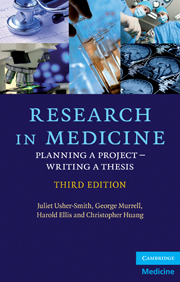Book contents
- Frontmatter
- Contents
- Preface
- 1 Introduction
- 2 Deciding whether to do research
- 3 Deciding when to do research
- 4 Selecting a research degree
- 5 Choosing a department, research supervisor and project
- 6 Applying for research positions and funding
- 7 Getting started
- 8 Overcoming frustration
- 9 Writing scientifically
- 10 Publishing a paper
- 11 Attending scientific meetings
- 12 Writing a thesis
- 13 Submitting a thesis and preparing for the viva voce examination
- Further reading
- Appendix: Information for research students wishing to study overseas
- Index
2 - Deciding whether to do research
Published online by Cambridge University Press: 05 May 2010
- Frontmatter
- Contents
- Preface
- 1 Introduction
- 2 Deciding whether to do research
- 3 Deciding when to do research
- 4 Selecting a research degree
- 5 Choosing a department, research supervisor and project
- 6 Applying for research positions and funding
- 7 Getting started
- 8 Overcoming frustration
- 9 Writing scientifically
- 10 Publishing a paper
- 11 Attending scientific meetings
- 12 Writing a thesis
- 13 Submitting a thesis and preparing for the viva voce examination
- Further reading
- Appendix: Information for research students wishing to study overseas
- Index
Summary
Research experience is increasingly important in today's fight for jobs and so the aspiring clinician may leap, somewhat reluctantly, into a research programme without carefully assessing its processes, outcomes, advantages and disadvantages. Some considerations as to whether or not one should do research at all are presented here.
The challenge
Research by its very nature offers a tremendous intellectual and personal challenge and has the potential to unearth information that may help the wider community.
Becoming a better clinician
A number of desirable qualities are necessary for, and consequently, developed in, research. These include an open, inquiring mind, logical thought, careful analysis of previous research with a mild degree of scepticism, an understanding of the processes necessary to achieve the presented result, self-discipline and self-sufficiency. It can be argued that many of these are also of considerable value in clinical practice. Almost any established clinician who has spent time in research during training, whether they are surgeons in district general hospitals, physicians in private practice or general practitioners, will tell you that they regard themselves better doctors as a result of this experience. They find themselves more able to analyse a clinical problem, appraise the results of their management of patients and assess objectively the latest claims from scientists, colleagues and pharmaceutical companies because of their exposure to the scientific method.
As part of an academic career
Without doubt, research achievement, including a higher degree by thesis, is essential for a career in academic medicine.
- Type
- Chapter
- Information
- Research in MedicinePlanning a Project – Writing a Thesis, pp. 5 - 8Publisher: Cambridge University PressPrint publication year: 2010

